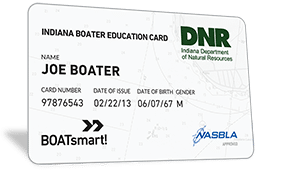
AGE REQUIREMENTS
Boat operators who are at least 15 years of age, who do not have a valid driver’s license or identification card, must obtain a Boater Education Card in order to legally operate a boat powered by an engine of 10 hp or more in Indiana.
Excellent!
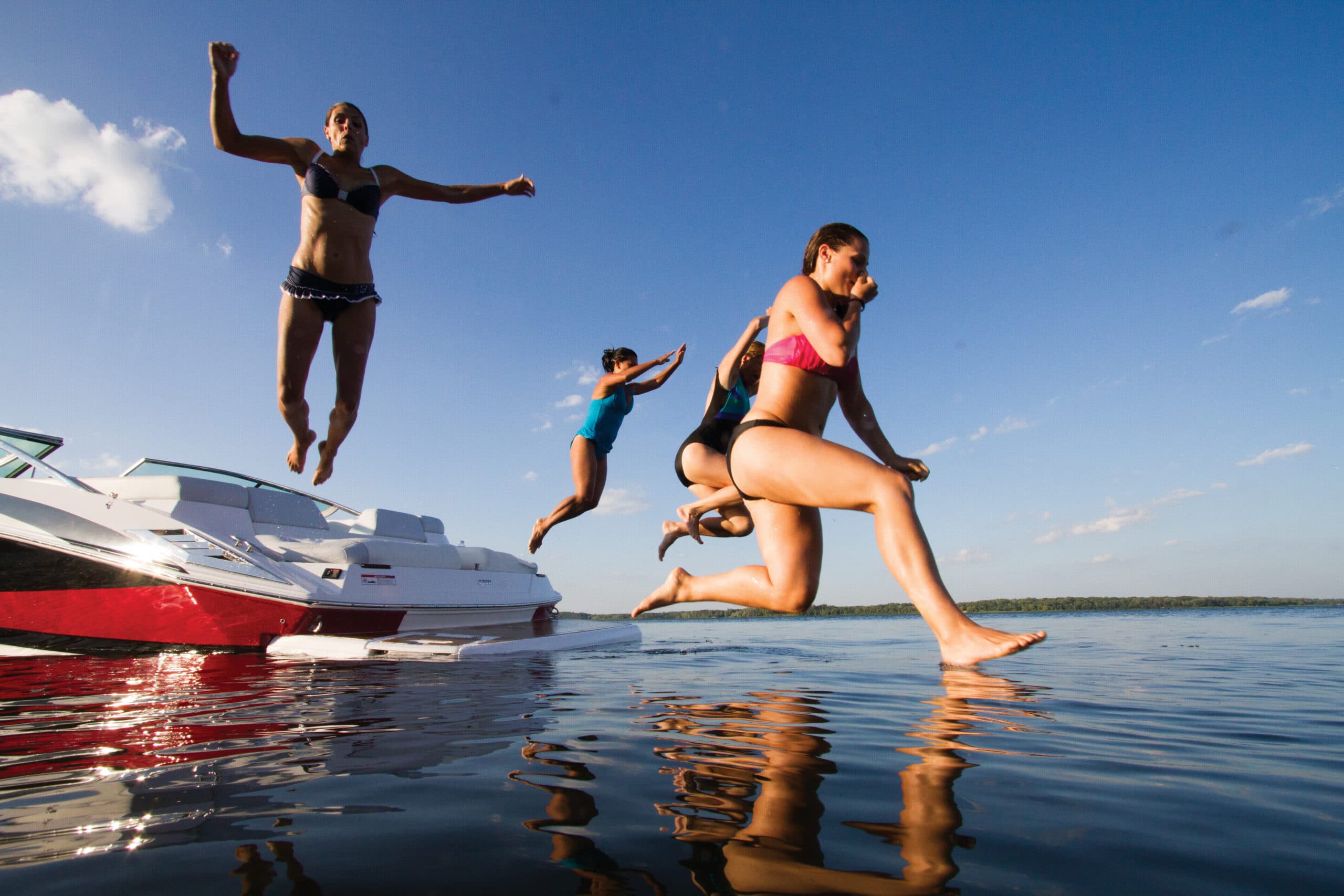

Official Indiana boating course
The Indiana BOATsmart! Boating Safety Course is approved and accredited by the Indiana Department of Natural Resources, Law Enforcement Division. With more than 3,000 Five Star Reviews, we’re proud to be recognized as an official Indiana State Boating Course and the choice of boaters in Indiana.
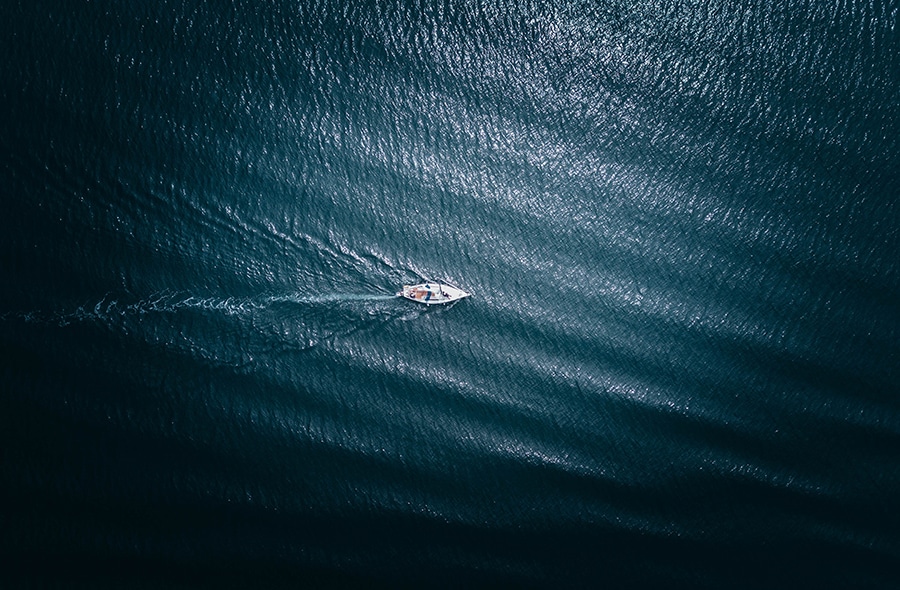

NASBLA & Coast Guard Approved
The BOATsmart! Indiana Boating Safety Course is officially recognized by the United States Coast Guard as meeting the standards of the National Recreational Boating Safety Program. BOATsmart!’s online Indiana Boating Safety Course is approved by the National Association of State Boating Law Administrators (NASBLA) as it meets and exceeds U.S. Boating Education Standards. NASBLA develops education standards for boating safety and represents boating law administrators in all 50 states and U.S. territories.
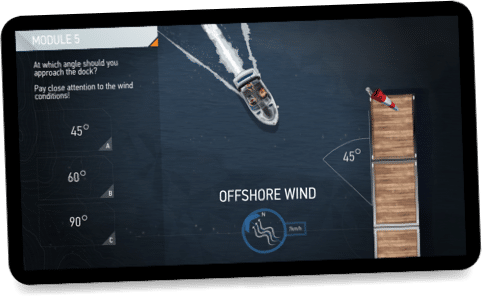
Watch, Listen & Learn
From anywhere, on any device at any time.
Our animated and narrated Boating Safety Course is perfect for all ages. Study from your Smartphone, Tablet or Desktop and switch between devices at any time. BOATsmart! automatically tracks your progress so you can study at your own pace.

Indiana Boating License Requirements
WHAT IS A INDIANA BOATER CARD
An Indiana Boater Education Card proves that you’ve obtained the knowledge needed to safely operate a motorized boat on Indiana waterways. All boat operators who are at least 15 years years of age are required to obtain a Boater Education Card to legally operate a boat of 10 hp or more within the State, unless otherwise exempt.
AGE AND HORSEPOWER RESTRICTIONS
15 YEARS OF AGE OR OLDER
Boat operators in Indiana who are at least 15 years of age are required to obtain a Boater Education Card to operate a boat with a motor of 10 hp or more, unless they have a valid driver’s license or state issued Identification Card.
LESS THAN 15 YEARS OF AGE
Boat operators who are less than 15 years of age are not permitted to operate a boat or PWC with a motor of 10 hp or more under any circumstances.
WHERE CAN I GET MY INDIANA BOATING LICENSE?
You can get your Indiana Boater Education Card by completing the Official BOATsmart! Course online. Once you successfully complete the online study guide and final exam, you can print a temporary card immediately. BOATsmart! will mail your permanent card within 4 weeks.
HOW OLD DO I HAVE TO BE TO GET A BOATER CARD IN INDIANA?
There is no minimum age to complete the Indiana Boater Education Course and obtain your Boater Education Card.
HOW LONG DOES IT TAKE TO GET MY BOATING LICENSE?
It takes a minimum of 3 hours to get your Indiana Boater Education Card online. Once you’ve completed the online course and official test, you can print a temporary card and go boating right away. Your permanent card will be mailed to you by BOATsmart! within 4 weeks.
CAN I GET REFRESHER LESSONS AFTER TAKING THE INDIANA BOATING COURSE?
Yes. Boat operators in the state of Indiana can keep up-to-date on the latest boating regulations with the free BOATsmart! Knowledge Base. Learn about boating equipment requirements, navigation and right-of-way regulations and restrictions that may apply on Indiana waterways to be sure that you’re safe and confident on the water.
DO I NEED A LICENSE TO RENT A BOAT IN INDIANA?
Boat operators in Indiana who are at least 15 years of age may rent a boat within the state so long as they have a valid driver’s license or state issued ID card, or have obtained a Boater Education Card.
Boating and alcohol in Indiana
Indiana boating and alcohol laws
No person shall operate any motorized boat on Indiana waters while they are under the influence of alcohol, drugs or a combination thereof. It is unlawful for owners of boats or personal watercraft (PWCs) to operate or allow anyone else to operate their boat or PWC while that person is intoxicated.
In Indiana, a person is considered to be under the influence if:
- They have a Blood Alcohol Concentration (BAC) level of 0.08% or higher.
- They are under the influence of alcohol and/or drugs such that their thoughts and actions are impaired and they have a loss of normal control of faculties to such an extent as to cause danger to others
Note: A BAC level of at least 0.05%, but less than 0.08%, may be used with other evidence in determining whether the person was under the influence of alcohol.
FINES AND PENALTIES
In Indiana, a person convicted of operating a boat while under the influence will be subject to the following penalties (the penalties of a Class C misdemeanor).
First offense (or the first in 10 years):
- They may lose all their driving privileges (motorized boat and motor vehicle) for at least 90 days and up to 2 years.
Second offense (within 5 years):
- They may be fined and jailed, and lose the privilege to operate a vehicle, boat, or PWC for 180 days and up to 2 years.
More severe penalties exist for additional convictions. Additionally, a person boating while under the influence who causes the death or serious injury of another person will, upon conviction, be guilty of a felony.
Indiana Boating Age Requirements
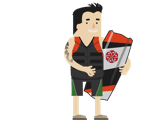
15 years of age or older
Boat operators in Indiana who are at least 15 years of age are required to obtain a Boater Education Card to operate a boat with a motor of 10 hp or more, unless they have a valid driver’s license or state issued Identification Card.

Less than 15 years of age
Boat operators who are less than 15 years of age are not permitted to operate a boat or PWC with a motor of 10 hp or more under any circumstances.

Indiana's Boating Fines

Operating Under the Influence
Up to $500

Misuse of Marine Sanitation Device
Up to $1000

Boater Education Violations
Up to $500
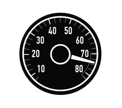
Reckless or Negligent Operation
Up to $250

Life Jacket Violations
Up to $500
General Indiana boating FAQs
Who regulates boating laws in Indiana?
The Indiana Department of Natural Resources, Law Enforcement Division is responsible for regulating boating laws in the state of Indiana.
WHO ENFORCES INDIANA BOATING LAWS?
Indiana’s boating laws are enforced by:
- Conservation Officers of the Indiana DNR.
- U.S. Coast Guard officers.
- Any other authorized peace officer or law enforcement officers.
Law enforcement officers have the authority to stop and board boats in order to check for compliance with state and federal laws. The Coast Guard also has enforcement authority on all Waters of Concurrent Jurisdiction.

How to register a boat in Indiana
INDIANA BOAT REGISTRATION
In order to legally operate a boat in Indiana, you must obtain a Certificate of Registration (registration card) and validation decals. The Certificate of Registration must be on board and be available for inspection by a law enforcement officer during boat operation.
Federally documented boats must also be registered by the state and display the excise decal.
If your boat requires registration, it is illegal to operate or to allow others to operate it until it is registered and properly numbered.
The Certificate of Registration and validation decals are valid for 1 year and may be obtained by submitting an application and fee to any Bureau of Motor Vehicles (BMV) License Branch.
THESE VESSELS DO NOT REQUIRE REGISTRATION IN INDIANA
- Boats acquired by the owner before January 1, 1986.
- Boats that are less than $3,000 in value when new.
- Home-made boats built for personal use and not for resale.
BOAT TITLING REQUIREMENTS
All boats that must be registered must also have a certificate of title.
DO I NEED BOAT INSURANCE IN INDIANA?
Boats in California are not required to be insured, however it is recommended.
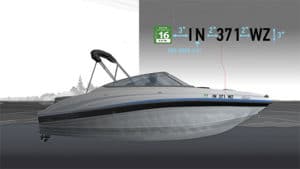
Boats in Indiana are required to correctly display their registration number and validation stickers.
Registration numbers and stickers must be displayed as follows:
- The numbers must be applied as a decal, painted or permanently affixed to each side of the boat’s bow (boat owners are not permitted to display any other numbers in this area).
- The numbers must be in bold block letters, be at least 3 inches high and in a color that contrasts with the color of the boat.
- The numbers must be separated from the letters by a 2-inch space.
- The numbers must be a single color and be clearly legible from a distance of 100 feet.
- The number must be read from left to right.
- Excise tax decals must be affixed on both sides of the boat, be displayed within 3 inches from, and in line with the registration number (only the current decal can be displayed).
- These requirements also apply to personal watercraft (PWCs).
Indiana life jacket laws

Indiana’s life jacket laws
All boats must carry one, wearable Coast Guard-approved life jacket or PFD for each person on board the boat or being towed. Boats 16 feet in length or greater (except a canoe or kayak) must also carry one throwable flotation device that is Coast Guard-approved and readily accessible.

Personal Watercraft and Towed Sports
Any person operating, riding on or being towed by a PWC is required to wear a Coast Guard-approved, life jacket. Inflatable life jackets are not accepted.

Children under 13 Years of age
When boating on Indiana’s waters of concurrent jurisdiction, a child under 13 years of age must wear a Coast Guard-approved life jacket at all times, unless the child is on a boat that is docked or at anchor, or they are in an enclosed cabin.

Towed Sports
On Indiana’s waters of concurrent jurisdiction, boaters must wear a Coast Guard-approved life jacket while being towed by a boat. Inflatable life jackets are not accepted.
Laws & Regulations
NEGLIGENT OR RECKLESS BOAT OPERATION
It is illegal in the state of Indiana to operate any boat or to manipulate any water-skis, aquaplane or similar device in a careless, reckless or negligent manner so as to endanger the life, limb or property of any person.
Examples of reckless operation include:
- Operating in a restricted area such as a designated swimming area.
- Weaving through congested traffic at more than idle speed.
- Jumping the wake of another boat when unreasonably close to the other boat.
- Waiting until the last possible moment to swerve to avoid a collision.
- Creating a hazardous wake.
- Harassing or disturbing wildlife.
- Allowing passengers to ride on the boat’s stern, bow, gunwales or transom (if the boat is less than 21 feet in length).
- Overloading a boat beyond the safe carrying capacity.
- Overpowering the boat beyond the recommended horsepower capacity.
- Towing a water-skier in a restricted area or where an obstruction exists.
- Interfering with the safe and lawful use of public waters by another person.
- Circular operation around fishers or swimmers
Illegal Boat Operation
Indiana law also state that the following are illegal:
- Operating a boat at speeds of more than 10 mph between sunset to sunrise.
- Boating in restricted zones (safety zones and ecological zones) without regard for other boaters or persons, posted speeds, and wake restrictions.
- Operating within 150 feet of a Divers-Down flag unless assisting the diver.
- Operating in a circular course around another boat engaged in fishing or a person swimming.
Environmental Protection
Non-native Aquatic Species
American waterways have been under threat from foreign aquatic plants, fish and invertebrates. Aquatic Nuisance Species (ANS) are transferred from boats and boating equipment that originate from external waterways. Once introduced to a new waterway, the ANS will detach from the contaminated boat and spread like wildfire. ANS include: Milfoil, Zebra Mussels and Quagga Mussels.
Why are ANS such a serious threat?
- They have no natural predators in U.S. waters.
- Some ANS can actually survive out of water, making transfer easy.
- They reproduce quickly.
- They have harmful effects on the native wildlife, habitats and ecosystems.
For more information on Aquatic Nuisance Species, visit: www.protectyourwaters.net/impacts.php.
Help prevent the spread of non-native species
- Inspect all surfaces of your boat and remove aquatic plants or animals before leaving any body of water.
- Ensure you flush raw-water cooling systems and clean sea-strainers before moving your boat from one body of water to another.
- Empty and dry any buckets before leaving a body of water.
- Remove any plant fragments from bait wells, fishing gear, trailers, dive gear or props.
- Dispose of plant fragments and bait into a garbage receptacle on land.
- Avoid chopping vegetation with your boat’s propeller.
- Clean and dry all live-wells prior to transporting your boat.
- Drain all water from your motor and bilge and dry all areas. t.
- Thoroughly wash your boat, including the hull, before putting it into a new body of water.
- Refer to specific drying times.
Infestations of non-native species
Report new infestations of non-native aquatic species to the U.S. Fish and Wildlife Service at (209) 946-6400.
INDIANA AQUATIC INVASIVE SPECIES RESOURCES
For more information on Aquatic Invasive Species in the state of Indiana, visit https://www.in.gov/dnr/3123.htm
Hoosier State, Blue Waters, Good Times

Indiana Boating Destinations
INDIANA’S BOATING DESTINATIONS
What’s your favorite way to spend a day on the water in Indiana, the ‘Hoosier state’? Rip up a lake in your wakeboard boat? Glide along the sandy shores of Lake Michigan on your SUP board? Capture an epic tube wipeout with your GoPro camera? Whatever your favourite type of watersport is, if you’re visiting Indiana, you’ll have no trouble finding an awesome waterway for your boating activities!
So, will you be visiting Indiana Dunes State Park and boating on Lake Michigan? Or hitting up the great museums and shopping in busy Indianapolis or Fort Wayne? Maybe you’ll be visiting the popular boating and fishing waters of the south-central Bloomington area? Truth is, it doesn’t really matter what area of the state you’ll be visiting, Indiana is a paradise for outdoor enthusiasts.
BEST BOATING LAKES
To help you plan out your Indiana boating trip, we’ve listed a few of our favorite lakes to go boating and paddling on in Indiana. But don’t let our list limit your travels – there are endless miles of shoreline in Indiana for swimming, whitewater rafting, tubing, kayaking and boating.
Remember, not all lakes will have boat access ramps and boat launching areas. Some launch ramps may even require a fee from you. So when you’re preparing to go boating and checking over your life jackets, safety gear, water sports equipment and the weather forecast, make sure you also research the lake and know where you can get water access before you go.
Our favorite boating lakes in Indiana include Monroe Lake, Lake Lemon, Lake Tippecanoe, Griffy Lake, Patoka Lake and Lake Michigan.
INDIANA STATE PARKS
Indiana’s State Parks offer historic sites, geologic wonders, camping, OHV trails and sparkling lakes for boaters and paddlers, among many other outdoor activities! These beautiful parks are here for you to use – so get out there and enjoy them! Feel like getting active? Go for a hike, drop a fishing line, or plan a kayak trip with your friends. Looking for some R&R? Relax on the white sand beaches of Indiana Dunes State Park. Feeling adventurous? Explore the deep, sandstone ravines of Turkey Run State Park!
If you plan on boating in a state park, find out where you will have boat access and launch ramps before you head out with your boat trailer in tow. If you plan on fishing in any of Indiana’s state parks (Summit Lake State Park is a good one for anglers!) make sure you learn up on Indiana’s fishing regulations, fishing license requirements and boating license requirements before you go

